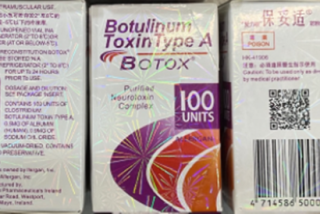Chinaâs latest scandal is counterfeit condoms
Reporting from Beijing â Sex shop owner Wang Yunsu wondered how so many competitors could suddenly undercut her low prophylactic prices.
Now she thinks she knows: The other condoms are counterfeit.
âSome manufacturers are cutting corners,â she said, stocking a shelf with a domestic brand whose name translates as Forever Love. âAnd itâs all about profit.â
Itâs Chinaâs latest knockoff scandal -- inferior contraceptives that health officials say provide little protection and may in fact spread infectious diseases, tarnishing the axiom that condoms mean safe sex.
In November, investigators in Hunan province provided details about a July raid on an underground workshop where they found laborers lubricating condoms with vegetable oil in unsterile conditions, passing off the counterfeits as high-quality-brand products.
It wasnât the first such bust. Police in 2008 raided an illicit factory in Zhejiang province, seizing half a million knockoff condoms.
In another case, workers recycled used condoms into hair bands in southern China.
âPeople could be infected with AIDS, [genital] warts or other diseases if they hold the rubber bands or strings in their mouths while weaving their hair into plaits or buns,â a dermatologist told the state-run China Daily newspaper.
The practice poses yet another disease threat in the worldâs most-populous nation, where more than 2 billion condoms are used each year, supporting an estimated $530-million industry.
China mass-produces countless fake brand-name consumer goods, from shoes and handbags to DVDs and iPods, even beer. But after tainted milk killed six Chinese children and sickened about 300,000 in 2008, the spread of counterfeit condoms further demonstrates that unscrupulous manufacturers will stop at nothing to turn a profit.
Authorities estimate that up to a third of the contraceptives used in some parts of China are counterfeits, despite improvements in state food and drug oversight. None of the counterfeits are properly sterilized, and others are of such inferior quality that they could rupture during use. Authorities say theyâre all dangerous.
âThe quality of the knockoff condoms cannot be guaranteed, and they can easily break,â said Cheng Feng, director of the group Family Health International, China. âSuch condoms definitely cannot play the role of contraception and disease prevention.â
But counterfeit condoms arenât being sold only in China.
In 2008, officials in the New York area confiscated knockoff Chinese-made goods, including millions of phony Trojan-brand condoms that were sold in small discount stores in New York, Texas and Virginia.
In the Hunan case, police told state news media that four people were arrested at a back-street factory in the city of Shaoyang, where an estimated 2 million unsterilized condoms carried labels of popular brands such as Durex, Rough Rider and Love Card.
Authorities have yet to track down more than 1 million condoms they believe have been distributed nationwide, lubricated with vegetable oil and stored in metal drums.
In China, more than 300 manufacturers produce condoms under 1,000 brand names. Health officials say the spread of the counterfeit condoms is linked to a diverse market in which the products are sold not just in pharmacies and healthcare shops but at roadside stalls and bars.
Online middlemen also peddle second-quality condoms produced at legitimate Chinese factories.
âThe quality is a little bit better than the counterfeits,â said one seller who uses the moniker Feiran Zhicheng, or âExtremely Trustworthy.â
âTheyâre not the best-quality ones, but thereâs not that big a difference,â he said of his product, which sells for a third the price of name brands. âItâs just that they didnât meet the standard for export. So they were left behind. Itâs like those âslightly imperfectâ products from the assembly line.â
Authorities are also pursuing the factories that are recycling condoms into hair bands sold in beauty shops for about 3 cents a package.
âThese cheap and colorful rubber bands and hair ties sell well, threatening the health of local people,â said the story in the China Daily.
Although shoddy and dangerous goods still flood the market, consumer protection here is improving, analysts say.
âGiven the vast size and complexities of the society, it is not surprising that there continue to be problems with product quality,â said Zha Daojiong, a professor at Peking Universityâs School of International Studies. âBack in the early 1990s, the Chinese government repeatedly launched âstrike hardâ campaigns -- throwing those involved in producing and selling below-quality products to years in jail.â
But, he added, proper monitoring systems cost money, resulting in higher prices.
âItâs impossible to have enhanced surveillance on the cheap,â Zha said. âA genuine dialogue [needs] to take place between the government and the populace at large [about] the costs the average consumer is prepared to pay.â
Vendors such as Wang say the government should do more to protect consumers.
âWe need to market better-quality products,â she said. âChinese people deserve them.â
Tommy Yang and Nicole Liu of The Timesâ Beijing Bureau and special correspondent Lily Kuo contributed to this report.
More to Read
Sign up for Essential California
The most important California stories and recommendations in your inbox every morning.
You may occasionally receive promotional content from the Los Angeles Times.











